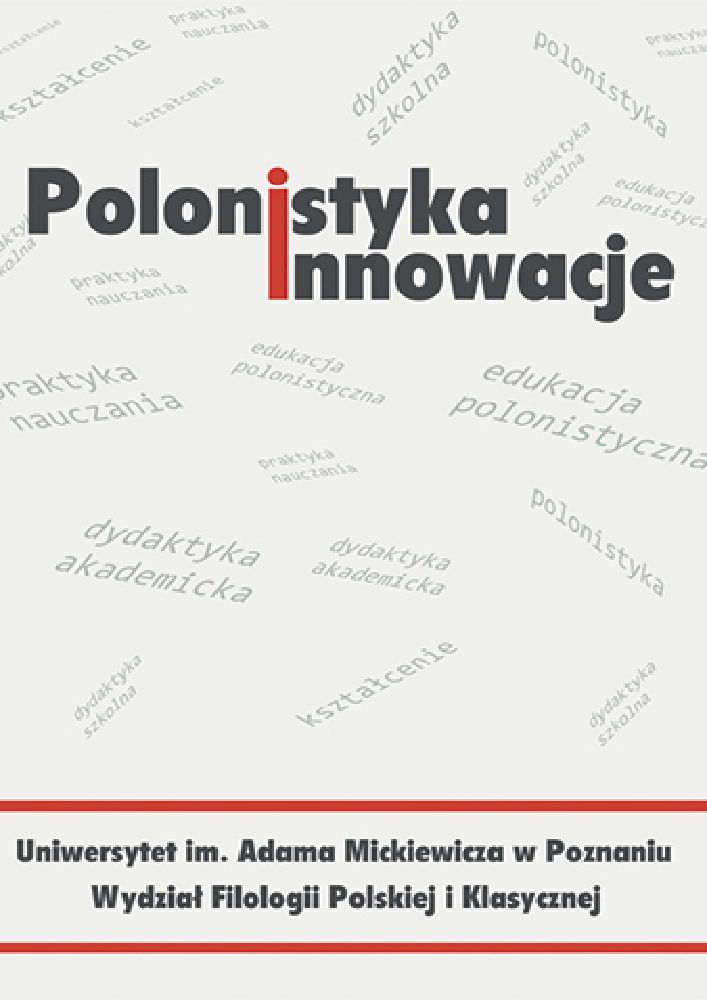Abstract
Starting from the results of empirical research on students’ reading motivations in relation to educational achievements, this article analyzes the properties of reading engagement. The circumstances conducive to reading engagement are considered as an attitude that eliminates educational inequalities. Possible didactic activities that would allow to develop students’ reading motivations were discussed. Among the most important premises indicating the circumstances building such an attitude is curiosity, interest in the text being read and the ability to derive satisfaction from the reception of complex narratives, including fictional ones. Synergy between school and beyond school duties reading can be such an opportunity. Discussion in a Polish language lesson is the best way to activate the social dimension of reading motivations – peer relationships can be used to build reading engagement.
References
Biedrzycki Krzysztof, Dobosz-Leszczyńska Wioleta, Burski Jan, 2018, Rozumienie czytanego tekstu, w: Sitek M., Ostrowska E.B. (red.), PISA 2018: czytanie, rozumienie, rozumowanie, Warszawa, s. 39-129, https://pisa.ibe.edu.pl/wp-content/uploads/2020/03/PISA_2018_wyniki_raport.pdf (dostęp: 11.11.2021).
Brzezińska Anna, 1987, Gotowość do czytania i pisania i jej rozwój w wieku przedszkolnym, w: Brzezińska A. (red.), Czytanie i pisanie – nowy język dziecka, Warszawa, s. 30–38.
Delgado Pablo, Vargas Cristina, Ackerman Rakefet, Salmerón Ladislao, 2018, Don’t throw away your printed books: A meta-analysis on the effects of reading media on comprehension, „Educational Research Review”, nr 25, s. 23-38.
Fredricks Jennifer A., Blumenfeld Phyllis C., Paris Alison H., 2004, School Engagement: Potential of the Concept, State of the Evidence, „Review of Educational Research”, Spring, tom 74, nr 1, s. 59-109.
Guthrie John T., Wigfield Allan, 2000, Engagement and motivation in reading, w: Kamil M.L., Mosenthal P.B., Pearson P.D., Barr R. (red.), Handbook of reading research: Volume III, Mahwah, New Yersey, s. 403-422.
Ivey Gay, Johnston Peter H., 2013, Engagement with young adult literature: Outcomes and processes, „Reading Research Quarterly”, nr 48, s. 255-275.
Marinak Barbara A., Gambrell Linda B., Mazzoni Susan A., 2013, Maximizing motivation for literacy learning: Grades K-6, New York, London.
Miall David S., 2006, Literary reading: Empirical nd theoretical studies, New York.
Miall David S., 2011, Emotions and the Structuring of Narrative Responses, „Poetics Today”, nr 2, s. 323-348.
Ryan Richard M, Deci Edward L., 2000, Intrinsic and extrinsic motivations: classic definitions and new directions, „Contemporary Educational Psychology”, nr 25, s. 54-67.
Zasacka Zofia, 2020, Czytelnictwo młodzieży szkolnej 2017, „Rocznik Biblioteki Narodowej”, nr 51, s. 11-242.
Zasacka Zofia, 2018, Socjalizacja do czytania – edukacja szkolna i kręgi rówieśnicze, „Rocznik Biblioteki Narodowej”, nr 49, s.187-217.
Zasacka Zofia, 2014, Czytelnictwo dzieci i młodzieży, Warszawa.
Zasacka Zofia, Bulkowski Krzysztof, 2015, Zaangażowanie w czytanie a osiągnięcia szkolne gimnazjalistów, „Edukacja”, nr 4 (135), s. 107–129.

